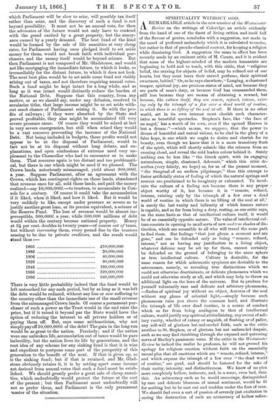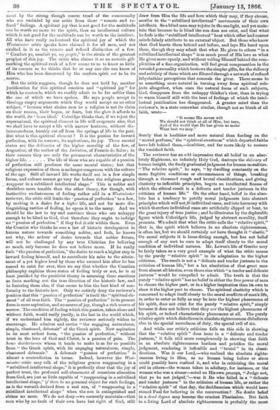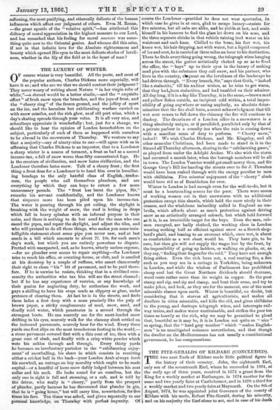SPIRITUALITY WITHOUT GOD.
A REMARKABLE article in the new number of the Westminster Cl Review on the writings of Coleridge, an article evidently
from the hand of one of the finest of living critics, and itself full of the flavour of genius, concludes with a suggestion, not made in the mood of profound melancholy which it is calculated to excite, but rather in that of pseudo-classical content, for keeping a religion while dismissing God. A suggestion the same in effect has been recently made by an eminent critic of M. Comte, and it is evident that some of the highest-minded of the modern humanists are beginning to hold and to teach, with this critic, that " religious belief, the craving for objects of belief, may be refined out of our hearts, but they must leave their sacred perfume, their spiritual sweetness, behind." Or, as he says elsewhere, " Longing, a chastened temper, spiritual joy, are precious states of mind, not because they are parts of man's duty, or because God has commanded them, still less because they are means of obtaining a reward, but because, like culture itself, they are remote, refined, intense, exist- ing only by the triumph of a few over a dead world of routine,
in which there is no lifting of the soul at all. If there is no other world, art in its own interest must cherish such character- istics as beautiful spectacles. Stephen's face, like ' the face of an angel,' has a worth of its own, even if the opened Heaven is but a dream :"—which means, we suppose, that the power to dream of beautiful and unreal visions, to be clad in the glory of a. false hope, is one which we ought to desire and cherish for its beauty, even though we know that it is a mere transitory flush of the spirit, which will shortly subside like the crimson from an evening cloud, and reveal the cold leaden colour behind it. Surely nothing can be less like " the Greek spirit, with its engaging naturalness, simple, chastened, debonair," which this critic de scribes (very falsely, we hope) as, for us of the present moment, " the Sangraal of an endless pilgrimage," than this attempt to foster artificially states of feeling of which the natural springs and sources are proclaimed to be imaginary or exhausted. To incul- cate the culture of a feeling not because there is any proper • object worthy of it, but because it is " remote, refined, intense, existing only by the triumph of a few over a dead
world of routine in which there is no lifting of the soul at all,' is surely the last vanity and infirmity of which human nature is capable, and so far from being a duty, resting, as our critic says, on the same basis as that of intellectual culture itself, it would be of an essentially opposite nature. The value of intellectual cul-
ture consists in opening to us all sorts of new and true shades of dis- tinction, which are accessible to all who will travel the same path to find them. But feelings "that just gleam a moment and are
gone," and can be defended only as being " remote, refined, intense," not as having any justification in a living object, whatever defence may be set up for them, cannot certainly be defended on the ground of belonging to the same sphere as true intellectual culture. Culture is desirable, for the same reason for which achromatic eyepieces are desirable to the astronomer, namely, as revealing true distinctions which we could not otherwise discriminate, or delicate phenomena which we could not otherwise study at all, and which may help to throw an additional light on the laws of the universe. But to produce for yourself voluntarily rare and delicate and arbitrary phenomena, —flashes of spiritual joy without an object, Auroras of the soul without any gleam of celestial light,—simply because such phenomena raise you above the common herd, and illustrate the triumph of life over dead routine, is a course of conduct which so far from being analagous to that of intellectual culture, would justify any spiritual attitudinizing, any swoon of soli- tary vanity, whether of extasy or anguish, of flushing or of pallor, any self-will of glorious but unfounded faith, such as the critic ascribes to St. Stephen, or of glorious but not unfounded despair, such as we may find throbbing through the exposed and quivering
nerve of Shelley's passionate verse. If the critic in the Westminster Review be indeed the realist he professes, he will not ground his
apology for religious emotion without faith on the essentially unreal plea that all emotions which are " remote, refined, intense," and which express the triumph of a few over "the dead world of routine," are good, and should be fostered for the sake of their rarity, intensity, and distinctiveness. We know of no plea more completely hollow, insincere, and, in a sense, even bad, than this. An aristocracy such as he would encourage, distinguished
by rare and delicate blossoms of unreal sentiment, would be fit for nothing but to be cast out and trodden under the foot of man.
We should feel even a sort of passion of severely just exultation in seeing the destruction of such an aristocracy of hollow refine-
ment by the strong though coarse tread of the commonalty who are excluded by our critic from these " remote and re- fined " feelings. A spiritual joy that is not good for the multitude can be worth no more to the spirit, than an intellectual culture which is not good for the multitude can be worth to the intellect. All who have really understood the spiritual joy of which the Westminster critic speaks have claimed it for all men, and not exulted in it as the remote and refined distinction of a few. " Comfort ye, comfort ye, my people," is the strain of the greatest prophet of this joy. The critic who claims it as an esoteric gift marking the spiritual rank of a few seems to us to know as little of its essence as he thinks that he or any one else can know of Him who has been discovered by the modern spirit not to be its , source.
But the critic suggests, though he does not hold by, another justification for this spiritual emotion and "spiritual joy" for which he contends, which we readily admit to be far nobler than the one of which we have spoken. He says people accept in theology empty arguments which they would accept on no other subject, " because what chains men to a religion is not its claim on their reason, their hopes, or fears, but the glow it affords to the world, its ' beau ideal.' Coleridge thinks that, if we reject the supernatural, the spiritual element in life will evaporate also, that we shall have to accept a life with narrow horizons, without dis- interestedness, harshly cut off from the springs of life in the past. But what is this spiritual element ? It is the passion for inward perfection, with its sorrows, its aspirations, its joy. These mental states are the delicacies of the higher morality of the few, of Augustine, of the author of the Imitation, of Francis de Sales ; in their essence they are only the permanent characteristics of the higher life The life of those who are capable of a passion of perfection still produces the same mental states ; but that religious expression of them is no longer congruous with the culture of the age. Still all inward life works itself out in a few simple forms, and culture cannot go very far before the religious graces reappear in a subtilized intellectual shape." This is nobler and doubtless more tenable than the other theory, for though, with instinctive exclusiveness of feeling rather odd in a Westminster reviewer, the critic still limits the passion of perfection' to a few, by making it a desire for a higher life, and not for mere dis- tinguishing rarities of feeling, he opens it to the many. And we should be the last to try and convince those who are unhappy enough to be blind to God, that therefore they ought to indulge no "passion of perfection" if they feel it stir within them. Even the Comtist who thinks he sees a law of historic developnient in human nature towards something nobler, and feels, he knows not why, the ardour of desire towards that nobler future, will not be challenged by any true Christian for believing so much, only because he does not believe more. If he really feels " the passion of perfection," the desire to reach a higher step in inward feeling himself, and to contribute his mite to the attain- ment of a yet higher level by those who succeed him after he has ceased to exist for ever, then we say that whether the Comtian philosophy explains those states of feeling truly or not, he is at least justified by the positivist theory in assuming these emotions as facts marking out the true direction of the historic law, and in fostering them also, if that seems to him the best kind of con- formity to the historic law. Only we entirely deny the reviewer's position that this " passion of perfection" is itself the " spiritual ele- ment " of all true faith. The " passion of perfection" in its present form is mere aspiration, and no source of joy, though a rich source of sorrow. The condition of feeling which this passion, taken alone and without faith, would really justify, is the last in the world which, if we understand him rightly, the reviewer seriously wishes to encourage. He admires and envies " the engaging naturalness; simple, chastened, debonair" of the Greek spirit. Now aspiration in its most ardent form, "the passion of perfection," without trust in the love of God and Christ, is a passion of pain. The home desideriorum whom it tends to make is as far as possible from " the Greek spirit, with its engaging naturalness, simple, chastened debonair." A debonair "passion of perfection" is almost a contradiction in terms. Indeed, however the West- minster critic may talk of the religious graces reappearing in a "subtilized intellectual shape," it is perfectly clear that the joy of perfect trust, the profound self-abasement of conscious alienation from God, are just as little capable of "reappearing in a subtilized intellectual shape," if there be no personal object for such feelings, as is the warmth derived from a real sun, of " reappearing in a subtilized intellectual shape" when the sun is extinguished and shines no more. We do not deny—we earnestly maintain—that men who by no fault of their own have lost sight of God, still
draw from Him the life and love which they may, if they choose, ascribe to the " subtilized intellectual" movements of their own intellect's. So a blind man may rejoice in the sunlight, and yet main- tain that because he is blind the sun does not exist, and that what he feels is the "subtilized intellectual" heat which other and coarser minds falsely attribute to an external 'object. But those who know that God besets them behind and before, and Iays Elis hand upon
them, though they may admit that what He gives to others " in a subtilized intellectual shape " is as much proof of His Jove as what He gives more openly, and without veiling Himself behind the com- plexities of a fine organization, will feel great compensation in the revealed personality which bestows the simpler gifts, for the delicacy and subtlety of those which are filtered through a network of refined labyrinthine perceptions that conceals the giver. There seems to us something more natural in turning away from spiritual sub- jects altogether, when once the natural focus of such subjects, God, disappears from the unhappy thinker's view, than in trying to warm himself still with the heat of feelings of which the intel- lectual justification has disappeared. A greater mind than the
reviewer's, in a state somewhat similar, though not so blank of all faith, wrote-
" It seems His newer will
We should not think at all of Him, but turn, And of the world that He has given us make What best we may."
Surely that is healthier and more natural than feeding on the "sacred perfume," the "spiritual sweetness" which departed faiths have left behind them,—healthier, and far more likely to restore the vanished faith.
The reviewer has an odd impression that all belief in an abso- lutely Righteous, an infinitely Holy God, destroys the delicacy of human insight, the finely graduated judgment for human moralities. "The relative spirit," he says, " by dwelling constantly an the more fugitive conditions or circumstances of things, breaking through a thousand rough and brutal classifications, and giving elasticity to inflexible principles, begets an intellectual finesse of which the ethical result is a delicate and tender justness in the criticism of human life." On the other hand, belief in the abso- lute has a tendency to petrify moral judgments into abstract principles which will not fit individual cases, and into harmony with which therefore individual cases are artificially clipped or bent, to the great injury of true justice ; and he illustrates by the deplorable figure which Coleridge's life, judged by abstract morality, itself presents. We admit that what the critic calls the "relative spirit," that is, the spirit which believes in no absolute righteousness, is often lax, but we should certainly not have thought it " elastic." On moral subjects it is loose-fitting enough, but has not belief enough of any sort to care to adapt itself closely to the moral condition of individual natures. Mr. Lewes's life of Goethe may be fairly taken as a very good example of what the critic means by the purely " relative spirit " in its adaptation to the higher criticism. The result is not a "delicate and tender justness in the criticism of human life," but a lax absolution of that great man from almost all his sins, even those sins which "a tender and delicate justness" would be compelled to admit. The truth is that the purely " relative spirit" has no belief in either the free power of man to choose the higher part, or in a higher inspiration than its own to show it the higher part to choose. The spiritual elasticity which is concerned to adapt itself closely to the moral conflicts of man's life, in order to enter as fully as may be into the highest phenomena of his spirit, does not exist for the purely "relative spirit," simply because it does not believe that they are the highest phenomena of his spirit, or indeed characteristic phenomena at all. The purely relative spirit which disbelieves in absolute righteousness disbelieves also in the special sacredness of duty, the special evil of sin.
And while our critic's criticism fails on this side in showing that the "relative spirit " does issue in a " delicate and tender justness," it fails still more conspicuously in showing that faith in an absolute righteousness hardens and petrifies the moral judgment, rendering it inflexible and " brutal" in its classi- fications. Was it our Lord,—who realized the absolute righte- ousness living in Him, as no human being before or since could possibly have realized it, and who in criticizing the moral evil in others—the woman taken in adultery, for instance, or the woman who was a sinner—acted on His own precept, " Judge not, that ye be not judged,"—was it He who failed in a "delicate and tender justness " in the criticism of human life, or rather the "relative spirit" of that day, the Sadduceeism which would have stoned Paul for believing in the resurrection ? No doubt belief in a dead dogma may become the cruelest Pharisaism. But faith in a living Lord of absolute righteousness is probably the most
softening, the most purifying, and ethereally delicate of the human influences which affect our judgment of others. Even M. Renan, —the great apostle of the "relative spirit,"—has attributed this delicacy of moral appreciation in the highest measure to our Lord, and has remarked that his feeling for moral nuances was some- thing quite new to the Oriental genius. And whence did this arise, if not in that infinite love for the Absolute righteousness and beauty which opened His eyes to the most delicate shades of loveli- ness, whether in the lily of the field or in the heart of man ?
































 Previous page
Previous page